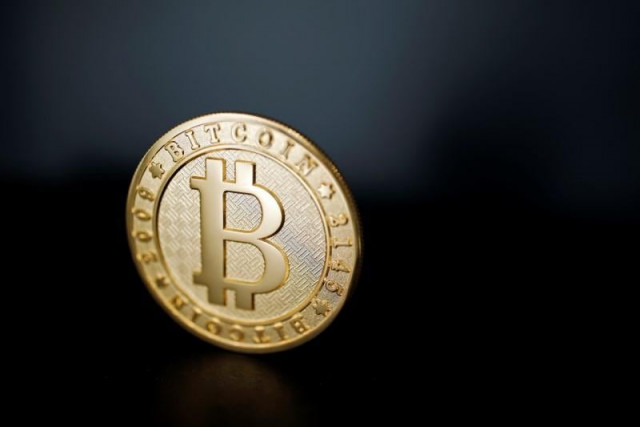You may not have noticed, but Bitcoin is creating space in Pakistan
Urdubit.com witnesses surge in traffic

A Bitcoin (virtual currency) coin is seen in an illustration picture taken at La Maison du Bitcoin in Paris, France, June 23, 2017. PHOTO: REUTERS
But, by its intrinsic nature, Bitcoin - the cryptocurrency currently making many lose sleep or gain wealth - has proved to be more volatile than any other asset. Its meteoric rise in 2017 has, however, gained it attention at Wall Street and helped it appear in the headlines more times than ever before.
From close to $800 at the start of the year, a single Bitcoin is now being traded for over $4,300.
China internet finance body suggests framework for bitcoin
A tech-savvy, 17-year old who invested minimal pocket money in a confusing but fast-becoming popular technology in 2011 when it cost $31 would be cherishing the best financial decision of his life.
But the story does not progress that smoothly. Unlike stocks, gold and currency trading, the market dynamics of Bitcoins were not well-defined from its inception in 2007. Massive booms were coupled with frequent crashes, the most recent being a 27% fall after China’s decision to close down Bitcoin exchanges in the country.
Back in 2014, a financial researcher and author found the volatility of the crypto/digital currency to be seven times greater than that of gold, eight times greater than that of the S&P 500, and 18 times greater than the US dollar.
Its presence in the digital space, an inability to be physically touched or put in a safe, also makes it more susceptible to technological threats.
But negative comments interspersed with reports of the world moving towards adopting digital currency has made Bitcoin stand out.
Adoption in Pakistan
Urdubit.com, the first and only Bitcoin exchange in the country, has seen increased visits on its website, said CEO Danyal Manzar.
“The amount is very hard to predict because people can trade individually, but the number of users is definitely on the rise,” he told The Express Tribune.
Asked when would be the best time to buy, considering the massive ups and downs in their prices, Manzar said it is a commodity and a technology, making it harder to predict prices in a manner similar to, say, stocks.
“If I knew the answer to this question, I would be on a private island right now and hosting my friends,” he quipped.
The technology angle is something most people ignore, he deplored.
“MIT and other universities worldwide are now using it as a notary medium for digital documents (document verification),” he said.
After toiling for years, veteran commodities trader Shahan Rehman advises against likening Bitcoins to stocks.
Bitcoin is a fraud and will blow up, says JPMorgan CEO
“The market is quite different from the stock exchange,” he said.
“I believe the best strategy is to take a long-term position, rather than trying to book profits through everyday price movements.”
Critics argue that Bitcoins resemble a ‘momentum stock’ with massive buying leading to an inflated price rather than any intrinsic, practical value of the commodity. While the current market dynamics support this theory, due to minimal usage on a global level, supporters such as the Urdubit.com CEO look at it in an alternative light.
“Cryptocurrency is designed to replace fiat currency in general,” he argued.
“It puts the entire money supply on a transparent ledger, which is easily verifiable and auditable. Imagine this: if Amazon.com gets hacked what happens to all the credit cards that are on file?
“With cryptocurrencies, once the payment is made there is no way to copy or extract more funds since every transaction requires the digital signature of the Bitcoin owner which is unique. So, it works like digital cash. “You can only have what I give you but with credit cards and other plastic currencies, if hackers gains access they can use your funds.”
‘System derailment’
Like all currencies, Bitcoin needs to be produced as well; albeit digitally. Supercomputers with fast processors are used to provide input to the Bitcoin software. The network thrives on this supply of energy since it is required to keep the ledger activated by recording all the transactions taking place.
Just the way there is a cost to printing notes, Bitcoin mining also has a hidden economy behind it. Miners can only make a profit if the cost of electricity is lower than 10 cents/kwh.
The two most prominent countries where mining is profitable are China and Norway. China also accounts for 23% of the global trade in Bitcoin.
Shutting down of exchanges by Chinese regulatory authorities leaves Bitcoin with an uncertain future. There are reports, however, that the move may be reversed.
Stability
Australia to regulate virtual currency exchanges like Bitcoin
Both Rehman and Manzar believe increased or widespread usage will make Bitcoin prices more stable, though they will not bet on it.
“Despite being accepted as a mode of payment by over 100,000 vendors including Microsoft and Dell, the markets are still affected by global news a lot,” Manzar opined.
“Acceptance by a country [most recently Japan] compels people to jump on the bandwagon, increasing its price massively,” Rehman said. “Alternatively, adverse statements like the recent one from [JP Morgan CEO] Jamie Dimon set alarm bells ringing in people’s minds and that leads to equally massive selling that pulls the market down,” he added.
Published in The Express Tribune, October 8th, 2017.
Like Business on Facebook, follow @TribuneBiz on Twitter to stay informed and join in the conversation.


















COMMENTS
Comments are moderated and generally will be posted if they are on-topic and not abusive.
For more information, please see our Comments FAQ